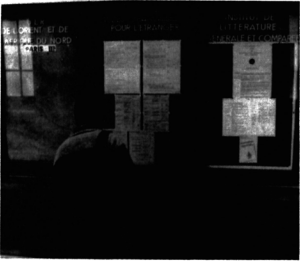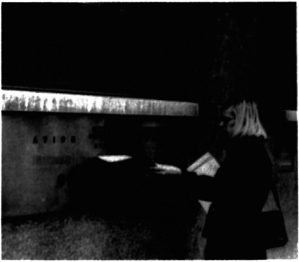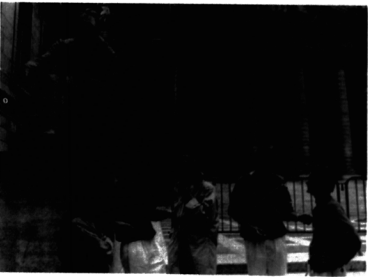8.2: What did Bob give you?
- Page ID
- 142320
Questions et Réponses
B. What did Bob give you?
- —Qu'est-ce que Bob t'a donné?
- —Il m'a donné un calendrier.
- —Qu'est-ce que vous allez envoyer à Philippe?
- —Je vais lui envoyer des disques.
C. To whom did you send the package? (Who d you send the package to?)
- —A qui avez-vous envoyé le paquet?
- —A mon oncle.
- —Vous lui envoyez souvent des paquets?
- —Non, pas souvent.
- —A qui est-ce que le prof offre ces livres?
- —Aux étudiants qui travaillent bien.
- —Il leur donne toujours quelque chose?
- —Oui.
Exercice II
Come to class prepared to ask at least three questions of your classmates and/or your instructor of the type, "What did X give to Y?" (using qu'est-ce que, as in item A), and. "To whom did X give Z?" (using à qui, as in item B).

D. Who gave you that tie?
- —Qui vous a offert cette cravate?!
- —Ma petite amie.
- —Posez une question de ce genre à Françoise.
- —Françoise, qui t'a donné ces boucles d'oreille?
- —Mon père m'a donné ces boucles.
E. How many tickets is he going to give them?
- —Combien de billets est-ce qu'il va leur donner?
- —Il va leur donner cinq billets.
- —Combien de livres est-ce que je t'ai donnés?
- —Tu m'as donné trois livres.

Exercice III
Prepare at least three questions to ask of your classmates and/or your instructor, of the type, "Who gave X that Y?" (using qui as in C), and three others of the type, "How many X is Y going to give Z?" (using combien de as in D).
SAVOIR and CONNAÎTRE
Both these verbs mean "to know" but are often used in distinct contexts, as illustrated below. Although you will sometimes hear connaître used in contexts where you'd expect savoir (e.g., "Je connais son adresse"), you should use each verb exclusively in the obvious contexts, as illustrated in the drills.
SAVOIR to know (a fact, how to do something)
| Je sais que Paris est en France. | I know Paris is in France. |
| Tu sais qu'il est mon professeur. | You know he's my professor |
| Elle sait chanter. | She knows how to sing. |
| Nous savons le nom de ces garçons. | We know the names of these boys. |
| Savez-vous que Nice est dans le Midi? | Did you know that Nice is in the Midi? |
| Ills savent jouer du piano. | They know how to play the piano. |
| Passé composé: j'ai su ("I learned, found out"), ... | |
| Imparfait: je savais, ... | |
| Futur: je saurai, ... | Futur proche: je vais savoir, ... |

CONNAÎTRE to know (be acquainted with)
| Je connais Paris. | I know Paris. |
| Tu connais le professeur Savary. | You know Professor Savary. |
| On connaît bien cette chanson. | People know that song well. |
| Nous connaissons ces garçons. | We know these boys. |
| Connaissez-vous Marseille? | Do you know Marseille? |
| Elles connaissent bien Paris. | They know Paris well. |
| Passé composé: j'ai connu ("I met" [for the first time]), ... | |
| Imparfait: je connaissais, ... | |
| Futur: je connaîtrai, ... | Futur proche: je vais connaître, ... |

